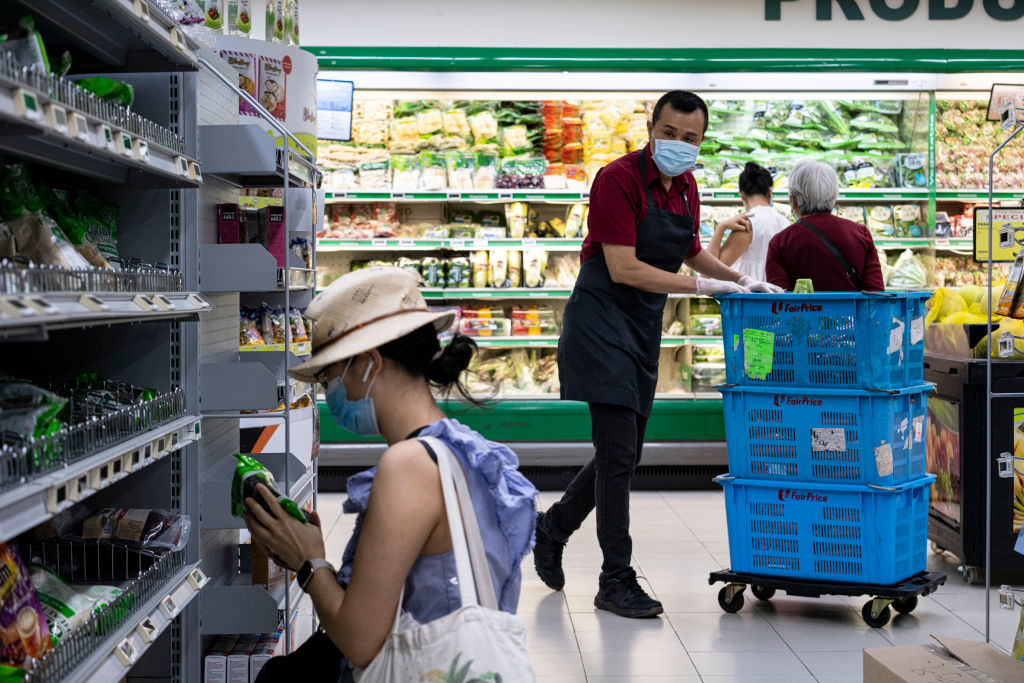COVID-19 is starting to take a deadly toll on grocery store workers


A free daily email with the biggest news stories of the day – and the best features from TheWeek.com
You are now subscribed
Your newsletter sign-up was successful
States and local governments have a patchwork of social distancing rules to slow the spread of the COVID-19 coronavirus, but all of them include supermarkets and grocery stores in the list of essential services exempt from closure. Now, "major supermarket chains are beginning to report their first coronavirus-related employee deaths, leading to store closures and increasing anxiety among grocery workers as the pandemic intensifies across the country," The Washington Post reports.
Grocery stores are looking to hire thousands of temporary workers to meet the sharp rise in demand from homebound customers, and even with the promise of hardship pay, gloves, make, and hand sanitizer, the deaths will likely give pause to potential hires. "One of the biggest mistakes supermarkets made early on was not allowing employees to wear masks and gloves the way they wanted to," supermarket analyst Phil Lempert told the Post. "We're going to start seeing people say, 'I'll just stay unemployed instead of risking my life for a temporary job.'"
The Post confirmed four deaths as of Monday: A Trader Joe's employee in Scarsdale, New York; two Walmart workers at the same store in Evergreen Park, Illinois, outside Chicago, in late March; and a 27-year-old greeter at a Giant supermarket in Largo, Maryland, who died last week. The Giant greeter, Leilani Jordan, "said, 'Mommy, I'm going to work because no one else is going to help the senior citizens get their groceries,'" her mother, Zenobia Shepherd, told the Post. "She only stopped going to work when she could no longer breathe."
The Week
Escape your echo chamber. Get the facts behind the news, plus analysis from multiple perspectives.

Sign up for The Week's Free Newsletters
From our morning news briefing to a weekly Good News Newsletter, get the best of The Week delivered directly to your inbox.
From our morning news briefing to a weekly Good News Newsletter, get the best of The Week delivered directly to your inbox.
In theory, a pandemic that forces people to stay home and threatens grocery store workers who have to interact with hundreds of customers is "the perfect moment for online grocery services," The Associated Press reports. "In practice, they've been struggling to keep up with a surge in orders, highlighting their limited ability to respond to an unprecedented onslaught of demand."
A free daily email with the biggest news stories of the day – and the best features from TheWeek.com
Peter has worked as a news and culture writer and editor at The Week since the site's launch in 2008. He covers politics, world affairs, religion and cultural currents. His journalism career began as a copy editor at a financial newswire and has included editorial positions at The New York Times Magazine, Facts on File, and Oregon State University.
-
 How Democrats are turning DOJ lemons into partisan lemonade
How Democrats are turning DOJ lemons into partisan lemonadeTODAY’S BIG QUESTION As the Trump administration continues to try — and fail — at indicting its political enemies, Democratic lawmakers have begun seizing the moment for themselves
-
 ICE’s new targets post-Minnesota retreat
ICE’s new targets post-Minnesota retreatIn the Spotlight Several cities are reportedly on ICE’s list for immigration crackdowns
-
 ‘Those rights don’t exist to protect criminals’
‘Those rights don’t exist to protect criminals’Instant Opinion Opinion, comment and editorials of the day
-
 TikTok secures deal to remain in US
TikTok secures deal to remain in USSpeed Read ByteDance will form a US version of the popular video-sharing platform
-
 Unemployment rate ticks up amid fall job losses
Unemployment rate ticks up amid fall job lossesSpeed Read Data released by the Commerce Department indicates ‘one of the weakest American labor markets in years’
-
 US mints final penny after 232-year run
US mints final penny after 232-year runSpeed Read Production of the one-cent coin has ended
-
 Warner Bros. explores sale amid Paramount bids
Warner Bros. explores sale amid Paramount bidsSpeed Read The media giant, home to HBO and DC Studios, has received interest from multiple buying parties
-
 Gold tops $4K per ounce, signaling financial unease
Gold tops $4K per ounce, signaling financial uneaseSpeed Read Investors are worried about President Donald Trump’s trade war
-
 Electronic Arts to go private in record $55B deal
Electronic Arts to go private in record $55B dealspeed read The video game giant is behind ‘The Sims’ and ‘Madden NFL’
-
 New York court tosses Trump's $500M fraud fine
New York court tosses Trump's $500M fraud fineSpeed Read A divided appeals court threw out a hefty penalty against President Trump for fraudulently inflating his wealth
-
 Trump said to seek government stake in Intel
Trump said to seek government stake in IntelSpeed Read The president and Intel CEO Lip-Bu Tan reportedly discussed the proposal at a recent meeting
